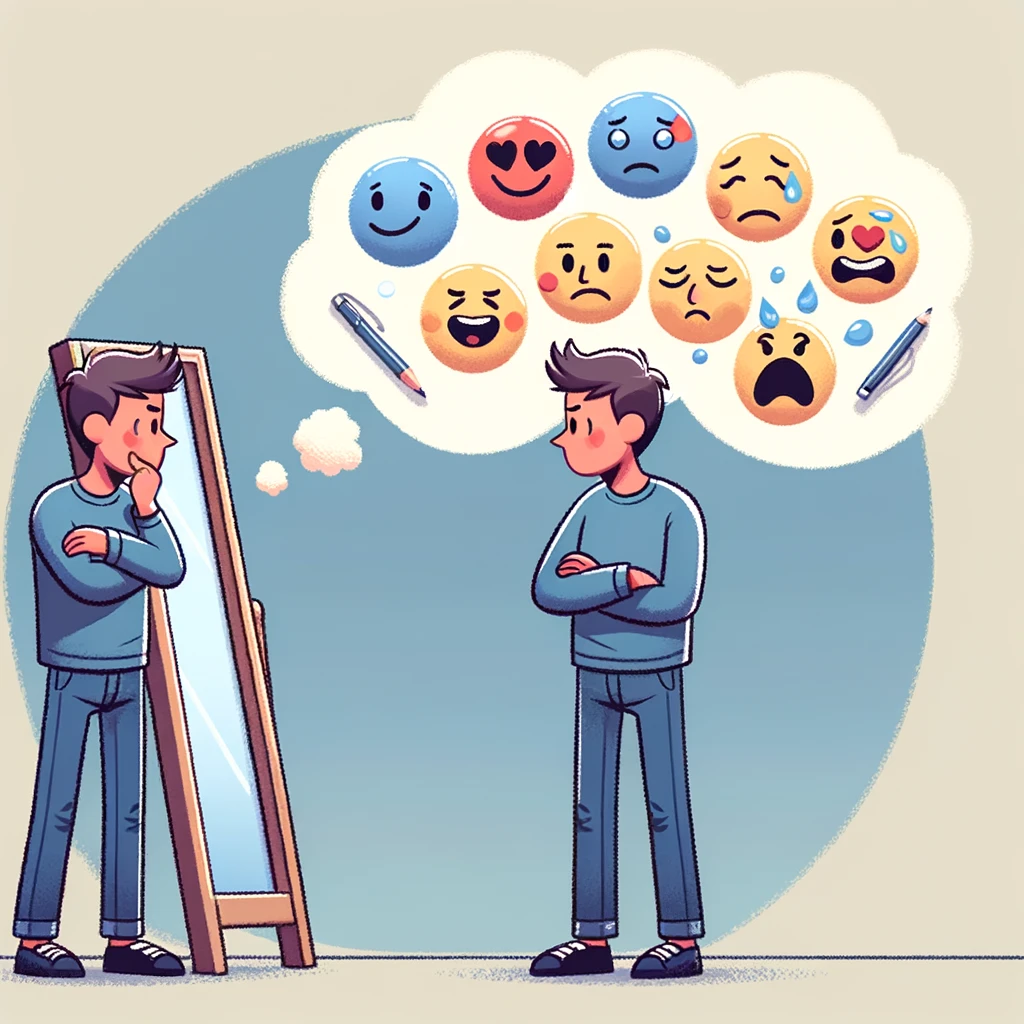Estimated reading time: 7 mins
The concept of Emotional Intelligence (EQ) has gained unprecedented importance in recent years. Beyond the traditional measures of intelligence such as IQ, a high EQ emerges as a crucial skill set, defining our ability to manage emotions, both our own and those of others. This dynamic aspect of human intelligence not only influences personal success but also plays a pivotal role in professional environments.
Emotional Intelligence is more than just a buzzword; it’s a multifaceted competency that interweaves awareness, control, and expression of one’s emotions with the sensitivity to perceive and respond to the emotions of others. High EQ enables individuals to navigate the complexities of social interactions, make informed decisions, and cultivate productive relationships. It’s about understanding the intricate dance of human emotions and using this understanding to foster empathy, effective communication, and resilience.
In this comprehensive discussion, we delve into the various dimensions of EQ. We explore its significance in different spheres of life, assess how one can gauge their own emotional intelligence, and offer insights into enhancing and harnessing this essential skill. Whether in personal relationships, workplace dynamics, or individual well-being, EQ stands out as a key determinant of success and fulfillment.
Understanding and developing your EQ is not just about achieving personal and professional goals; it’s about enriching your life experience. Let’s embark on this journey to discover if you have high EQ and how it can transform your life.

Understanding Emotional Intelligence and High EQ
Emotional Intelligence (EQ) comprises several key skills: self-awareness, self-regulation, motivation, empathy, and social skills.
- Self-awareness: This is the ability to recognize and understand your own emotions and how they affect your thoughts and behavior. It includes an accurate self-assessment of your strengths and weaknesses and a well-grounded sense of self-confidence.
- Self-regulation: This involves controlling or redirecting your disruptive emotions and adapting to changing circumstances. It includes the ability to manage impulses, to suspend judgment, and to think before acting.
- Motivation: People with a high degree of EQ are generally motivated by things beyond external rewards like fame, money, or recognition. They are passionate about what they do, persevere in the face of setbacks, and are driven by an inner ambition.
- Empathy: This is the ability to understand the emotional makeup of other people. A high EQ involves recognizing and understanding others’ emotions and responding appropriately. It’s about treating people according to their emotional reactions.
- Social skills: This is about managing relationships to move people in desired directions. It involves effective communication, leadership, the ability to inspire and influence, conflict management, and team building.


The Importance of High EQ
High EQ has profound implications in various aspects of life:
- Personal Relationships: High EQ individuals are usually more successful in maintaining relationships, understanding and managing emotions – both their own and others’. This leads to healthier and more fulfilling personal interactions.
- Workplace Success: In the workplace, high EQ can translate into better teamwork, leadership, and communication. It often correlates with improved performance and professional success.
- Mental Health: Emotional intelligence is linked to mental well-being. It helps in coping with stress, reducing anxiety, and steering clear of depression.
- Physical Health: EQ can even impact physical health. The ability to handle stress impacts physical ailments like blood pressure and heart health.


Assessing Your EQ
Determining your level of emotional intelligence (EQ) is crucial for personal growth and building meaningful relationships. To evaluate your EQ, introspection and honest self-assessment are key. Consider the following detailed questions to gain deeper insights into your emotional intelligence:
- Understanding Your Emotions: How accurately and quickly can you identify your emotions? High EQ involves recognizing feelings as they arise and understanding their source. Reflect on instances where your emotions guided your decisions. Do you often understand why you feel a certain way, or do you find yourself puzzled by your emotional reactions?
- Regulating Your Emotions: Assess how well you manage emotional distress. Can you remain composed under stress or do you tend to react impulsively? High EQ is characterized by the ability to control emotional responses and express them appropriately. Think about situations where you had to adjust your emotions to cope with a circumstance – how did you handle that?
- Self-Motivation: Consider how effectively you can motivate yourself, particularly in challenging situations. High EQ individuals often pursue goals with optimism and resilience, even after setbacks. Reflect on how you approach long-term goals and whether your motivation is intrinsic or driven by external rewards.
- Empathy and Understanding Others: How well do you understand and relate to the emotions of others? EQ involves being able to put yourself in someone else’s shoes. Think about your interactions: are you able to pick up on subtle emotional cues? Do you adjust your behavior in response to the feelings of others?
- Social Skills and Relationship Management: Evaluate your ability to maintain and nurture relationships. This includes clear communication, conflict resolution, and the capacity to inspire or influence others. Consider the quality of your various relationships – do you find it easy to build rapport, or do you struggle with social interactions?
- Self-Perception and Confidence: High EQ also includes a strong sense of self. How do you view your own strengths and weaknesses? Are you confident in your abilities and comfortable with who you are? People with high EQ often have a balanced understanding of their capabilities and areas for growth.
- Adaptability and Flexibility: How do you handle change or unexpected challenges? High emotional intelligence involves being flexible and adapting to new situations without undue stress.
By exploring these aspects, you can gauge your level of EQ and identify areas for improvement. Remember, emotional intelligence is not a fixed trait; it can be developed and enhanced over time with conscious effort and practice.
Ways to Improve Your EQ
Enhancing your emotional intelligence (EQ) is a continuous journey that requires dedication, self-awareness, and a willingness to grow. Whether you’re looking to improve your personal relationships, enhance your professional capabilities, or simply gain a better understanding of yourself, the following strategies can help you develop a higher EQ:
- Develop Self-Awareness: Start by observing your emotions and reactions. Journaling can be an effective tool for this. Record your feelings and the events that trigger them. This practice can help you detect patterns and understand your emotional triggers more clearly.
- Practice Mindfulness: Mindfulness involves being present and fully engaged with the current moment. It helps in recognizing and accepting your emotional states without judgment. Try meditation, deep breathing exercises, or simply take a few moments each day to reflect on your thoughts and feelings.
- Work on Self-Regulation: Once you’re aware of your emotions, strive to manage them constructively. This might involve developing coping strategies like taking a walk to cool off when angry or finding constructive outlets for emotional expression. Practicing patience and remaining calm under pressure are key aspects of self-regulation.
- Improve Your Social Skills: Effective communication is crucial. Practice active listening, which involves fully concentrating on what is being said rather than just passively hearing the words. Work on your non-verbal communication as well. Body language, eye contact, and facial expressions can greatly enhance the way you relate to others.
- Cultivate Empathy: Try to understand things from other people’s perspectives. Show genuine interest in their feelings and life experiences. Empathy builds deeper, more meaningful connections and is essential for successful interpersonal interactions.
- Enhance Your Motivation: Set personal goals and find intrinsic motivations beyond external rewards like money or fame. Staying optimistic and viewing challenges as opportunities for growth can foster resilience and a stronger sense of purpose.
- Learn Conflict Resolution: Navigating disagreements effectively is a key component of high EQ. Work on your negotiation skills and strive to approach conflicts with a problem-solving mindset. It’s important to seek mutually beneficial solutions rather than ‘winning’ the argument.
- Seek Feedback and Learn: Don’t hesitate to ask for feedback about how you handle emotions and interact with others. Be open to constructive criticism and willing to learn from it. This can provide invaluable insights into areas where you can improve.
- Reflect on Your Progress: Regularly take time to reflect on your emotional growth. Acknowledge your improvements and identify any ongoing challenges. This reflection is crucial for continuous personal development.
By integrating these practices into your daily life, you can steadily enhance your EQ, leading to more fulfilling personal interactions, improved mental health, and greater success in your professional life. Remember, improving EQ is a lifelong process that enriches not just your own life but also the lives of those around you.


The Journey of Emotional Growth
Developing high EQ is a journey, not a destination. It’s about continual learning and growth. Understanding and improving your emotional intelligence can lead to a more fulfilling and balanced life, both personally and professionally.
Remember, everyone has the potential to improve their EQ. It requires dedication, practice, and a willingness to step out of your comfort zone. By cultivating high emotional intelligence, you can enhance your relationships, achieve your career goals, and foster a healthier, more satisfying life.
In conclusion, EQ is a valuable asset in all walks of life. By assessing your current emotional intelligence levels and continuously striving to improve, you can unlock the door to a more emotionally aware, fulfilling existence. Whether it’s in personal relationships, professional settings, or within yourself, high EQ can be a game-changer. So, do you have high EQ? If not, are you ready to embark on this transformative journey? Remember, the path to high EQ is always open; it’s never too late to start.
